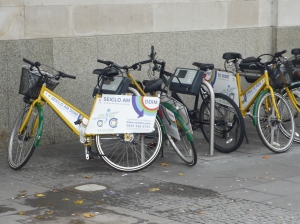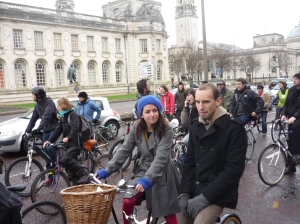Filed under: Climate Change, Transport | Tags: Cardiff Council, CO2, Copenhagen Summit, On Your Bike - Free Ride Scheme, Sustrans Cymru
 In light of events surrounding the Copenhagen Climate Summit, there’s a growing public awareness of the threats posed by climate change. But is this translating into effective action in Cardiff? The city has been making a concerted effort to reduce CO² emissions and combat climate change through a project aptly named ‘sustainable Cardiff’. Selected as Wales’ first “sustainable travel city” by the Assembly Government, a £28.5 million scheme aims to reduce congestion and pollution and promote public transport. Part of the money has already been invested into providing free cycle hire, bus travel around the city centre, and improved bike and walking routes. The money has also given a final go ahead for the Pont-y-Werin (translation: Bridge for the people) pedestrian and cycle bridge across the Ely river between Cardiff’s sports village and Penarth.
In light of events surrounding the Copenhagen Climate Summit, there’s a growing public awareness of the threats posed by climate change. But is this translating into effective action in Cardiff? The city has been making a concerted effort to reduce CO² emissions and combat climate change through a project aptly named ‘sustainable Cardiff’. Selected as Wales’ first “sustainable travel city” by the Assembly Government, a £28.5 million scheme aims to reduce congestion and pollution and promote public transport. Part of the money has already been invested into providing free cycle hire, bus travel around the city centre, and improved bike and walking routes. The money has also given a final go ahead for the Pont-y-Werin (translation: Bridge for the people) pedestrian and cycle bridge across the Ely river between Cardiff’s sports village and Penarth.
On your bike
Transport, particularly private cars are widely acknowledged as one of the biggest contributors to carbon emissions. Scientists say the need to change the way we travel is becoming ever more pressing.  Cardiff Council have introduced a ‘keep cardiff moving’ travel plan that aims to cut car journeys and encourage the public to use buses, cycle, walk, or share car journeys at the very least. In terms of total impact on climate change, driving is thought to release around six times more CO² emissions than flying and seven times more than ships and boats. Cars alone create nearly half of our total transport emissions.
Cardiff Council have introduced a ‘keep cardiff moving’ travel plan that aims to cut car journeys and encourage the public to use buses, cycle, walk, or share car journeys at the very least. In terms of total impact on climate change, driving is thought to release around six times more CO² emissions than flying and seven times more than ships and boats. Cars alone create nearly half of our total transport emissions.
Changing perceptions
Lee Waters, Director of sustainable travel charity, Sustrans Cymru says achieving a sustainable travel plan in Cardiff will only be successful if people change their perceptions. “People need to be shown that there are alternatives rather than using a car all the time. We need to encourage people to use their cars less and choose to travel in ways that benefit their health and the environment’. Listen below to Lee Waters, Director of Sustrans Cymru on ‘False Perceptions’…
“We need to break down this car culture and realise that it’s quicker and healthier to get around the city on a bike or walk.” Critical Mass is a peaceful gathering that wishes to see less car-dominated cities and more people cycling. On the first Saturday of every month, bikers depart from the steps of the Cardiff Museum at 11am and cycle en-masse around the city centre to raise awareness of cyclists in Cardiff.
‘Cardiff Cycling Campaign’ join the event every month – they are an organisation that promote cycling and are bidding for improved cycle routes and a cleaner transport environment. Cardiff Council claim “Cardiff is becoming an increasingly cycle-friendly city with 80km of cycle routes”. However, Cardiff Cycling Campaign argue ‘some of these cycle routes are no more than lines on the map, with nothing but blue “cycling permitted” signs to show that bikes are allowed on the road.’ They are currently campaigning for cycling access through the new St Davids 2 development, the A470, the Cogan Spur, and the Western Cycling Corridor.
On Your Bike – Free Ride Scheme (OYBIKE)
Cardiff residents and visitors who register with the Cardiff Bike Scheme can hire a bike from bike stations in 10 locations in Cardiff city centre and Cardiff Bay.
Users have to register online and pay an £18 annual fee or £5 a week to use the bikes, which are free for the first 30 minutes and have a small charge after that. Delme Bowen, Councillor for Traffic and Transportation says the new OYBIKE scheme which started in September has so far successfully seen a monthly increase in usage within Cardiff. Have a listen below:
I thought I would have a go at Cardiff’s new Bike scheme. Watch the video below to view my experience.
There’s mixed opinion in Cardiff. Some people think it’s a great idea whilst others need a little more convincing…
Lee Waters says ‘the OYBike scheme in Cardiff is still only on a very modest scale compared with similar programmes in Copenhagen or Paris. In Cardiff, there are only about 70 bikes and 9 drop off points. However he also points out that thirty years ago Copenhagen had the same level of cycling that Cardiff has today. Now, over a third of all commuting journeys in the Danish capital are by bike. Let’s hope Cardiff has the potential to achieve the same.
